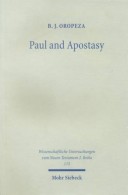Wissenschaftliche Untersuchungen zum Neuen Testament 2. Reihe
1 primary work
Book 115
B. J. Oropeza presents the concepts of apostasy and perseverance in the light of recent interpretative and intertextual methods. He argues that the Pauline messages include warnings to congregation members who are in danger of falling away. Paul often considers these members to be authentic converts to the early Christian message. A prime example of this is presented in the apostle's use of the Exodus-wilderness traditions in 1 Corinthians 10:1-13. In an effort to persuade the members against apostasy, Paul echoes examples from the Jewish traditions regarding Israel's divine election and punishments. The Corinthians are exhorted not to conduct themselves in a manner that parallels the Israelites who, after crossing the Red Sea, were rejected by God in the wilderness because they committed vices. If the Corinthians commit the same vices in their own spiritual journey, they will suffer divine judgment before the culmination of the eschaton. This language is located within larger rhetorical arguments related to the problems of meat sacrificed to idols, congregational factions and eschatological misperceptions. B. J. Oropeza also deals with theological perspectives associated with the perseverance of the saints, including the Calvinist and Arminian traditions. He thus provides a compelling alternative approach to the theological controversy.
